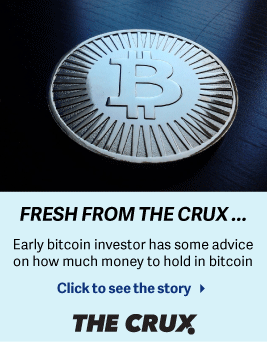| Home | About Us | Resources | Archive | Free Reports | Market Window |
|
Steve's note: If you've read my writings, you know that I haven't commented on cryptocurrencies like bitcoin much. I simply don't have the expertise myself... And I don't want to "fake" that I do.
But if you are interested in speculating in bitcoin, I urge you to pay attention to my friend Tama Churchouse. He knows better than anyone how to get started. And if his recent essays have piqued your interest, read on for details on a live event we're hosting tonight, where you can hear his unique perspective on the crypto markets.
So You Want to Buy Bitcoin... Now What?By
Wednesday, October 18, 2017
With bitcoin soaring through $5,500 and beyond, you'd be forgiven – if you haven't bought any yet – for thinking you've missed the boat... that the opportunity has slipped through your fingers.
Relax. The opportunity is still there. But it's meaningless if you don't take any action to seize it...
Bitcoin works a little differently than the investments you might be used to. Today, I'll share three simple things you need to know before you get started.
Speaking from personal experience, I highly recommend that folks looking to buy some bitcoins start with an extremely small amount... no more than a single bitcoin's worth. (You can use less money and buy a fraction of a bitcoin, if you prefer.) The process of buying, moving, and storing bitcoins is not like traditional online banking or investing. If you send bitcoins to the wrong location, for example, you can't just call up your bank and cancel your transaction. So it's critical to first familiarize yourself with the mechanics of moving bitcoins around with a relatively small sum, before moving on to larger dollar amounts.
It's ironic that while bitcoin is a highly modern technology, you must make sure to keep offline records of all your bitcoin information. That means pen and paper – or at least using a Microsoft Word document and printing it out as a backup. You see, storing, sending, and receiving bitcoin involves setting up a digital wallet. This is where you "keep" your bitcoins.
Your wallet has a public key (which might look a bit like this: 1GwV7fPX97hmavc6iNrUZUogmjpLPrPFoE). This functions like an account name where the bitcoins get sent to.
Your wallet also has a private key. This will either be an alpha-numeric sequence that looks like the public key above, or a long sequence of random words generated by the wallet. This is the "password" you use to access your wallet.
Either way, secure wallets do not have an "I forgot my password" option.
If you lose or forget your private key, you lose access to your wallet. And you lose your investment. Period.
I write everything down, and I print out screenshots if I need to (that is, printouts of what is shown on the screen).
In order to convert your cash into bitcoin, you need to open an account with an exchange. This process will typically take a few days, since the exchange will need to conduct KYC ("know your customer") diligence on you. This means a standard identity verification so the exchange knows who you are, and that you're not a wanted criminal.
Once you've opened the account, you'll be able to fund it with a bank transfer – or by credit card, in some cases – before you start buying bitcoins.
If the exchange where you bought bitcoin gets hacked – and if you left your bitcoins there – then you can lose your money. This has happened in a couple of high-profile cases.
For example, in 2014, bitcoin exchange Mt. Gox filed for bankruptcy, saying that 750,000 of customer bitcoins were missing. That's more than $4 billion-worth at today's prices. At the time, Mt. Gox was handling up to 70% of all bitcoin volume.
The safest place to store your bitcoins is in your digital wallet. You'll find a good selection to choose from online.
Good investing,
Tama Churchouse
Further Reading:
As Tama explained today, you haven't missed the boat on bitcoin. "Over the next year or so, we will see much greater sums of money flow into cryptocurrencies," he writes. "And bitcoin is likely to be the biggest beneficiary." Read more here: The Big Advantage You Have Over Institutional Investors.
You might be hesitant to get started with bitcoin – especially if you're bullish on gold. But Tama argues that you should hold both in your portfolio. "When you have an opportunity to buy the future and tuck it away, you should take it," he says. Learn more here: Bitcoin Won't Replace Gold... Here's Why You Should Still Own It.
Market NotesTHIS PEST-CONTROL LEADER IS ALWAYS IN DEMAND Today's chart highlights one of our favorite strategies at work... buying companies that sell simple products.
You don't need to sell flashy or innovative products to have a successful business. "Boring" products like cigarettes, soda, coffee, and pet food are always in demand. These staples are the cornerstones of steady, profitable businesses that generate good cash flows for investors. For proof, we'll look at a pest-control company...
Rollins (ROL) is a world leader in pest control. Its leading brand – Orkin – helps more than 2 million customers fight off termites, ants, and bedbugs. Pest control isn't the most exciting business, but it's stable. Rollins' earnings have grown for 18 years... And it has raised its dividend by 12% per year for 14 years. This steady growth is reflected in the company's rising share price...
As you can see below, Rollins shares have soared over the past five years. They're up more than 210%... And they just hit a new all-time high. Pest control may be a boring – and unappealing – line of work, but Rollins shows it can lead to big profits...
_48A0VC6FTQ.png) |
Recent Articles
|



